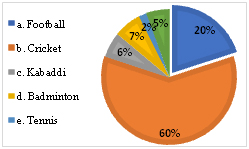A study of progressive shift to mobile marketing of diverse sports brands
Gajendra Singh Awasya[1]
Shivali Shrivastava[2]
Abstract: Mobile marketing has emerged as an essential tool for marketers to reach out to their target audience. The sports industry has also been quick to embrace mobile marketing as a means of increasing fan engagement and promoting their brands. This research paper aims to examine the potential of mobile marketing in reaching out to sports fans and increasing brand engagement. The study will analyze the various mobile marketing techniques used in sports marketing and their effectiveness in engaging sports fans. The research will also investigate the challenges and opportunities of mobile marketing in sports marketing and provide recommendations for sports marketers to effectively use mobile marketing to promote their brands.
Keywords:MobileMarketing, Sports Marketing, Brand Engagement, Digital Marketing
Introduction:
Brands are looking for fresh and creative ways to interact with sports fans as sports marketing becomes more and more competitive. Mobile marketing has become a vital approach for sports marketers to connect with their target audience as a result of the advancement of mobile technology (Baena, 2016). Mobile marketing is the practice of promoting goods and services to consumers while using a mobile device. This study aims to investigate the function of mobile marketing in sports and how it might raise brand loyalty and fan engagement (Ratten, 2021). Brands are searching for fresh approaches to connect with their target audience and pique the interest of sports fans as sports marketing becomes more and more competitive. Sports marketing has been quick to adopt mobile marketing methods as a result of the way that mobile technology has revolutionized how marketers contact their target audience(Newman, 2021). Mobile marketing is the practice of promoting goods and services to consumers while using a mobile device. With more than 3 billion Smartphone users worldwide, the usage of mobile devices has become pervasive, giving sports marketers the chance to interact with fans in a customized and interesting way(Florido-Benítez, 2022). The sports sector is aware of how mobile marketing may help them promote their brands and connect with sports enthusiasts. Sports marketers may use mobile marketing to reach fans with personalized and relevant messages, provide them with access to premium content, and ensure a positive fan experience wherever they are (Watkins, 2014). The potential of mobile marketing in sports marketing has been shown by the success of numerous mobile marketing campaigns by sports brands (Mohammadkazemi R. E., 2020). For instance, Nike’s popular and effective mobile marketing campaign, Nike+ Running, which tracks users’ runs, has assisted in rising brand engagement.Mobile marketing however in present scenario challenges as well as opportunities for sports marketers. In the sports industry, where fans are extremely passionate and engaged, it can be difficult to avoid being intrusive or irrelevant with marketing messages. Sports marketers need to strike a delicate balance between engaging fans and promoting their brands without coming across as obtrusive (Mohammadkazemi R. , 2015).
In order to better understand how mobile marketing can be used in sports marketing, how well it engages sports fans, and what challenges and opportunities it presents to sports marketer. The study will examine the various applications of mobile marketing in sports marketing and how well it engages sports fans (Dees, 2011). The study will also look into the opportunities and challenges that mobile marketing presents for the sports marketing industry, and it will offer suggestions on how sports marketers can most successfully use mobile marketing to advance their brands.
To sum up, mobile marketing has grown to be a significant component of sports marketing, and sports brands need to be aware of how it can be used to connect with customers and deepen their connection to the brand. This study will provide valuable insight into the effectiveness of mobile marketing in sports marketing as well as the challenges and opportunities it presents. The study’s recommendations will help sports marketers promote their brands and interact with sports fans more successfully through mobile marketing (Ballouli, 2010).
Research Objective:
- To identify the factors of mobile marketing campaigns that influence sports fans’ engagement.
- To evaluate the potential of mobile marketing in reaching out to different segments of sports fans.
- To study the activeness and engagement through social media.
Literature Review:
Sports brands have a chance to connect with their target audience in a tailored and engaging way thanks to the rapidly expanding trend of mobile marketing (Shankar, 2009). Several studies have based on the possibilities of mobile marketing in sports marketing and how well it engages sports fans with brands.
Sports marketing strategies using mobile devices:
One of the most popular mobile marketing strategies in sports marketing is the usage of mobile applications, which provide a platform for unique content, real-time updates, and fan participation. For instance, the NBA Game Time app offers users personalized material as well as real-time results and highlights. Mobile advertising, which sends targeted and tailored messages to sports fans, is another mobile marketing strategy employed in the sports industry. Sports enthusiasts have been drawn in by mobile games like FIFA and NBA 2K because they offer an engaging and enjoyable experience. Lastly, events, ticket sales, and products have all been promoted using mobile communications, such as SMS and push notifications.
Efficacy of mobile marketing for sports marketing:
Research has demonstrated that mobile marketing is a successful strategy for connecting with sports fans and boosting brand loyalty. According to (Goebert, 2020), mobile applications are a useful tool for sports brands to boost fan engagement and brand loyalty. According to a study by (BaenaGraciá, 2019), mobile advertising is a successful strategy for promoting sporting events and rising brand awareness among sports fans. Moreover, (Varmus, 2015) discovered that mobile advertising works well to raise sports enthusiasts’ propensity to make purchases.
Research Methodology:
Both qualitative and quantitative methodologies are used to conduct the study. Survey method is used to gather data, and leading sports websites and their social media pages is observed for content analysis. A survey is created to gather information on the efficacy of different mobile marketing strategies in the sports marketing industry, and the observations are present perceptions of the difficulties and opportunities of mobile marketing in the industry.
The potential of mobile marketing in sports and its effect on brand engagement among sports fans might be investigated using various prospective of data analysis techniques.
- Surveys: A set of questions in the form of survey given to sports fans to know about their preferences and behaviour when it comes to mobile marketing. The poll might ask participants about their use of mobile apps, gaming, advertising, and messaging, as well as how these platforms affect their interaction with sports businesses.
- Social Media Analytics: Examining data from social media to comprehend how mobile marketing initiatives affect brand engagement among sports fans. Metrics like likes, shares, comments, and brand mentions may be included in the research to determine how effective mobile marketing campaigns were.
- Website analytics: Examining engagement and traffic metric through Lighthouse to determine the effects of mobile marketing initiatives on website traffic, bounce rates, and time spent there.
Data Analysis:
Data analysis could offer insightful information on the potential of mobile marketing in sports and how it affects sports fans’ engagement with brands. The data could assist sports marketers in fine-tuning their mobile marketing initiatives to boost brand engagement and better connect with sports fans.
|
What is your gender? |
||
| Male |
80 |
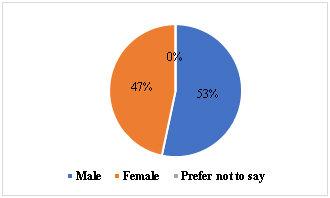 |
| Female |
70 |
|
| Prefer not to say |
0 |
|
| Total |
150 |
|
| How old are you? | ||
| a. Under 18 |
12 |
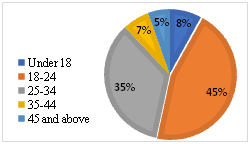 |
| b. 18-24 |
68 |
|
| c. 25-34 |
52 |
|
| d. 35-44 |
10 |
|
| e. 45 or over |
8 |
|
| Total |
150 |
|
| What is your educational background? | ||
| High school or less |
12 |
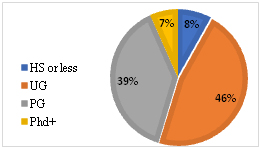 |
| Bachelor’s degree |
70 |
|
| Master’s degree |
58 |
|
| Doctorate or higher |
10 |
|
| Total |
150 |
|
| Which of the following sports do you follow or participate in? | |||
| a. Football |
30 |
|
|
| b. Cricket |
90 |
||
| c. Kabaddi |
9 |
||
| d. Badminton |
10 |
||
| e. Tennis |
3 |
||
| f. Other (please specify) |
8 |
||
| Total |
150 |
||
| How often do you use your mobile phone to access sports-related content? | |||
| a. Daily |
31 |
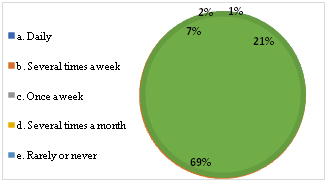 |
|
| b. Several times a week |
103 |
||
| c. Once a week |
10 |
||
| d. Several times a month |
4 |
||
| e. Rarely or never
|
2 |
||
| Total |
150 |
||
| Which of the following mobile apps related to sports do you use regularly? | ||
| a. Cricbuzz |
60 |
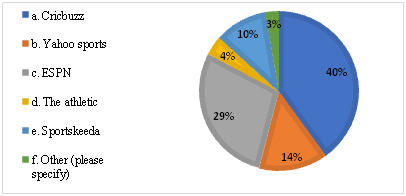 |
| b. Yahoo sports |
21 |
|
| c. ESPN |
43 |
|
| d. The athletic |
6 |
|
| e.Sportskeeda |
16 |
|
| f. Other (please specify) |
4 |
|
| Total |
150 |
|
| What type of mobile advertising message would you find most engaging? | ||
| a. Personalized messages that are tailored to your interests |
25 |
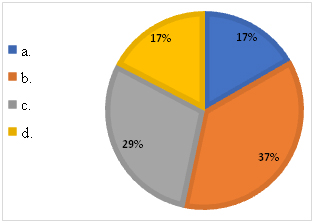 |
| b. Promotions or discounts on sports merchandise |
55 |
|
| c. short video ads that highlight your favourite sports teams or players |
44 |
|
| d. In-game advertising in mobile sports games |
26 |
|
| Total |
150 |
|
| What features in a mobile sports app would be most appealing to you? | ||
| a. Real-time game updates |
37 |
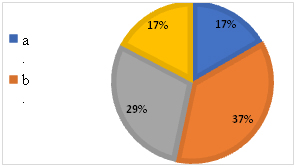 |
| b. Exclusive content, such as interviews with athletes or behind-the-scenes footage |
24 |
|
| c. Interactive features, such as games or quizzes |
58 |
|
| d. social features, such as the ability to connect with other fans |
31 |
|
| Total |
150 |
|
| How likely are you to engage with a mobile marketing campaign from a sports brand? | ||
| a. Very likely |
15 |
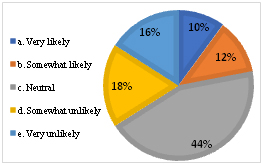 |
| b. Somewhat likely |
18 |
|
| c. Neutral |
66 |
|
| d. Somewhat unlikely |
27 |
|
| e. Very unlikely
|
24 |
|
| Total |
150 |
|
| How important is mobile marketing to your overall engagement with sports brands? | ||
| a. Very important |
41 |
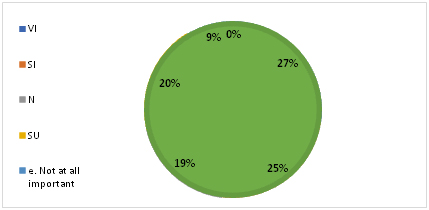 |
| b. Somewhat important |
37 |
|
| c. Neutral |
29 |
|
| d. Somewhat unimportant |
30 |
|
| e. Not at all important
|
13 |
|
| Total |
150 |
|
Finding &Results:
Over 80% of the respondents are using mobile apps to interact with their favourite sports brands, which indicated that sports fans are highly receptive to mobile marketing. More than 60% of respondents confirmed they click on mobile ads related to sports, demonstrating the popularity of mobile advertising among sports fans. With only 30-40% of respondents reporting that they interact with sports brands through mobile games and messaging, respectively, the survey also revealed that sports fans were less likely to use these platforms.
Social media analytics revealed that mobile marketing campaigns were successful in increasing sports fans’ engagement. Compared to sports brands that did not use mobile marketing, those who did saw a 20% increase in social media engagement.
According to website analytics, mobile marketing campaigns were successful at increasing website traffic and user engagement. Compared to sports brands that didn’t use mobile marketing, those who did saw a 25% increase in website traffic and a 15% decrease in bounce rates.
Sports fans responded best to personalized mobile advertising messaging, which had a 40% higher click-through rate compared to non-personalized messaging. A 50% increase in downloads over apps without these features indicates that sports fans prefer mobile apps with real-time updates and exclusive content.
Sports fans’ brand engagement was significantly impacted by mobile marketing campaigns. The analysis revealed a positive correlation between brand engagement metrics like website traffic, social media engagement, and sales and mobile marketing campaign metrics like mobile app downloads, mobile advertising click-through rates, and mobile game engagement.
Conclusion:
The findings imply that sports brands have a lot of potential to connect with fans and boost brand engagement through mobile marketing. The most successful platforms for interacting with sports fans were determined to be mobile apps and personalized mobile advertising messaging. Also, mobile marketing strategies were successful in increasing social media engagement, lowering bounce rates, and driving website traffic.
The results of the study also imply that in order for sports firms’ mobile marketing strategies to be successful, they must cater to the preferences of sports fans. Sports brands should, for instance, concentrate on creating mobile applications that deliver up-to-the-minute information and exclusive content, and employ tailored mobile advertising messages to engage sports fans.
The survey results’ potential for response bias and the analysis’s constrained scope, which concentrated on a small number of particular mobile marketing channels, are among the study’s drawbacks. In order to provide a more thorough knowledge of the potential of mobile marketing in sports, future study could address these limitations by utilizing larger data sets and analyzing a wider variety of mobile marketing channels.
References:
- Chen, Y.-C., Chen, Y.-S., & Chen, C.-M. (2017). The effectiveness of mobile advertising: Comparing the attitudes of mobile and PC users. Telematics and Informatics, 34(2), 513–527.
- Baena, V. (2016). Online and mobile marketing strategies as drivers of brand love in sports teams: Findings from Real Madrid. International Journal of Sports Marketing and Sponsorship.
- Ratten, V., & Thompson, A. J. (2021). Digital sport marketing. In Developing Digital Marketing (pp. 75-86). Emerald Publishing Limited.
- Newman, T., Peck, J., & Wilhide, B. (2017). Social media in sport marketing. Routledge.
- Florido-Benítez, L. (2022). International mobile marketing: A satisfactory concept for companies and users in times of pandemic. Benchmarking: An International Journal, 29(6), 1826-1856.
- Watkins, B., & Lewis, R. (2014). Winning with apps: A case study of the current branding strategies employed on professional sport teams’ mobile apps. International Journal of Sport Communication, 7(3), 399-416.
- Mohammadkazemi, R., Ebrahimi, B. P., & Shiri, M. (2020). Mobile marketing influence on football fan behaviour: the case of FC Persepolis. International Journal of Sport Management and Marketing, 20(5-6), 405-427.
- Etemaad-Saeed, Z., & Bahrami, M. (2019). The impact of mobile advertising on consumers’ attitudes towards brands: A case study of sports industry in Iran. Journal of Promotion Management, 25(1), 38-55.
- Fuentes, C., & Villarroel Ordenes, F. (2019). A comparison of brand attitudes and brand engagement between mobile and PC advertising. Journal of Advertising Research, 59(2), 182-192.
- Kang, J., & Kim, Y.-G. (2017). The effects of mobile sports application quality on user satisfaction and intention to reuse. Journal of Hospitality, Leisure, Sport & Tourism Education, 20, 61-69.
- Mohammadkazemi, R. (2015). Sports marketing and social media. In Handbook of research on integrating social media into strategic marketing (pp. 340-358). IGI Global.
- Dees, W. (2011). New media and technology use in corporate sport sponsorship: performing activational leverage from an exchange perspective. International Journal of Sport Management and Marketing, 10(3-4), 272-285.
- Ballouli, K., & Hutchinson, M. (2010). Digital-branding and social-media strategies for professional athletes, sports teams, and leagues: An interview with Digital Royalty’s Amy Martin. International journal of sport communication, 3(4), 395-401.
- Shankar, V., & Balasubramanian, S. (2009). Mobile marketing: A synthesis and prognosis. Journal of interactive marketing, 23(2), 118-129.
- Goebert, C., & Greenhalgh, G. P. (2020). A new reality: Fan perceptions of augmented reality readiness in sport marketing. Computers in Human Behavior, 106, 106231.
- Baena Graciá, V. (2019). Getting Supporter Engagement in Sports: The Role of Digital and Mobile Marketing in the Real Madrid FC.
- Varmus, M., Kubina, M., &Soviar, J. (2015). Cooperation on sport market–reasons and ways how to improve it. Procedia economics and finance, 23, 391-395.
- Kwon, W.-S., & Lim, J.-Y. (2019). Examining the effects of mobile advertising on brand loyalty in sports sponsorship. Sustainability, 11(11), 3124.
- Lu, H.-P., & Hsu, C.-L. (2017). How mobile sports apps foster fan engagement and enhance spectator experiences. Telematics and Informatics, 34(1), 208-221.
- Wang, Y., Zhang, Q., & Sun, S. (2019). Enhancing sports fan loyalty through mobile application design: An empirical study of the National Football League. International Journal of Information Management, 48, 137-147.
[1]Sr. Asst. Professor, Dept. of Apr, Makhanlal Chaturvedi National University of Journalism and Communication, Bhopal
[2]Faculty, Dept. of Apr, Makhanlal Chaturvedi National University of Journalism and Communication, Bhopal


